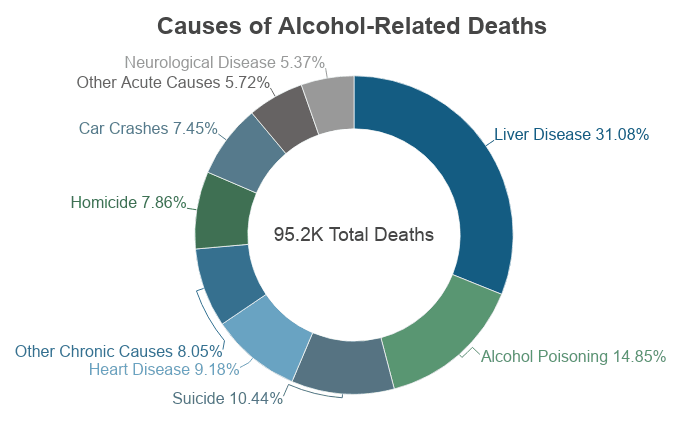Is Alcohol the Enemy? Booze It or Lose It
Alcohol has been a staple in American culture for generations, but lately the "sober curious" movement has gained steam and for good reason.
Summertime is officially here and the season of Aperol Spritz’s, frozen margaritas, and cold beer is upon us. This Fourth of July, Americans planned to spend around $4B on alcoholic beverages. While I love a good margarita on the beach just as much as the next person, after multiple weddings, birthdays, holidays, and vacations it’s starting to take it’s toll. Don’t get me wrong, this is not a declaration of my sober curiosity, but it is an acknowledgment of the effects of alcohol and why consuming in excess is not something I want to be doing in the future.
I’m not the only one feeling this way, in fact 41% of Americans are trying to drink less alcohol. The broader “sober curious” movement has gained a lot of traction recently with the rise of non-alcoholic alternatives and the widespread information dissemination of the more severe health impacts alcohol has on our bodies. The younger generations are driving this new movement with 61% of Gen Z and 49% of Millennials trying to drink less. 36% of Gen Zers are going alcohol-free for their mental health while other factors such as saving money, improving physical health, and losing weight also play a large role in this decision.
The sober curious movement has gained momentum through social media, where individuals have taken to sharing their experiences and encouraged others to join. Many influencers and even celebrities have preached about their non addiction related sobriety. In response, there has been a significant rise in the demand for non-alcoholic drinks, such as mocktails and alcohol-free beers, reflecting the movement’s influence on consumer behavior. Many beverage companies are increasingly catering to this demographic by offering a wider range of non-alcoholic options. Companies such as Athletic Brewing, Surely, and Ghia are offering beer, wine, and mocktail options to the masses. There are even several startups aimed at helping consumers understand the impact of alcohol on their health and keeping them accountable in their sobriety journeys. Seek Health has created an at home diagnostic test to help women understand how alcohol impacts her body whether she wants to focus on sleep, energy levels, reproductive health, or her risk for breast cancer.
Despite feeling like total crap after a few glasses of wine at dinner or one too many cocktails, alcohol has serious health effects that should cause concern. Alcohol consumption can have multiple physical impacts ranging from immediate to long-term health consequences. It can have impacts on the brain, heart, liver, pancreas, bones, immune system, digestive system, reproductive system, and so on. Alcohol consumption can lead to increased risk of several types of cancer, including head and neck, esophageal, liver, breast, and colorectal cancers. Approximately 19,500 cancer deaths in the U.S. annually are alcohol related.
Alcohol interferes with the brain’s communication pathways, affecting mood, behavior, and coordination. Heavy drinking can shrink the brain and impair its ability to process information and learn new tasks. Overconsumption can cause cardiomyopathy, arrhythmias, high blood pressure, and even stroke. The liver is severely impacted by alcohol as it breaks down and eliminate toxins created in your gut when you digest food, alcohol, or medication. Alcohol was involved in 46% of liver disease deaths in 2022.
Mental health is also drastically influenced by chronic alcohol consumption. It can also lead to mood disorders and cognitive decline. Alcohol disrupts the balance of neurotransmitters in the brain, which effects thoughts feelings, and behavior and increasing the risk of depression, panic disorder, and impulsive behavior. Hangovers including nausea, headaches, and vomiting can also increase anxiety and depression.
Guidelines suggest no more than one drink per day for women and two for men in order to minimize health risks, but many suggest abstaining completely or limit drinking to once a month or quarter given the direct links to so many severe health problems. Many Americans are transitioning to mindful consumption practices and even cutting out alcohol completely because of desire to not only prevent these long-term health effects, but improve sleep, mental clarity, and physical fitness due to its impacts on sleep patterns, cognitive function, and weight management.
While I am not considering giving up alcohol completely, going into the second half of 2024 I am encouraged to cut back significantly and find other ways to enjoy events that tend to revolve around alcohol. The long-term health effects just aren’t worth the short term buzz, in my personal opinion, but I will always say yes to a good craft cocktail when appropriate.







